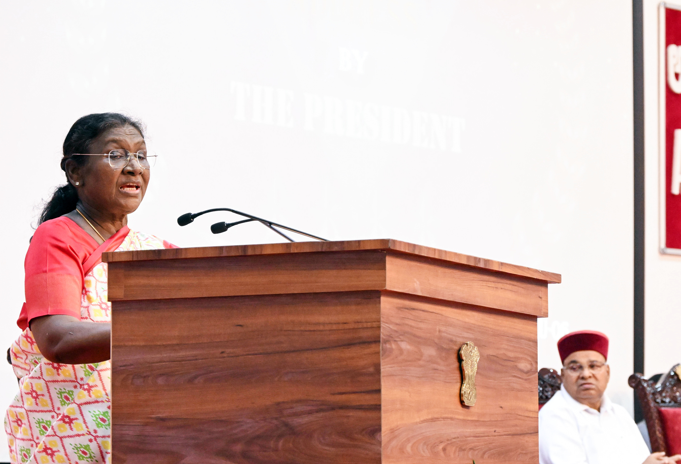President Droupadi Murmu on Monday emphasized the need for India to become self-reliant in the development and manufacturing of assistive technologies for individuals with speech and hearing impairments.
She made the remarks at the diamond jubilee celebrations of the All India Institute of Speech and Hearing (AIISH) in Karnataka’s Mysuru and lauded the institute’s six decades of pioneering work in education, clinical services, and research in the field of communication disorders.
The event, attended by Karnataka Governor Thawar Chand Gehlot, Chief Minister Siddaramaiah, Union Minister of State for Health and Family Welfare Anupriya Patel, Karnataka Health Minister Dinesh Gundu Rao, and Mysuru MP Yaduveer Krishnadatta Chamaraja Wadiyar, marked 60 years of AIISH’s journey since its establishment in 1965 as an autonomous body under the Ministry of Health and Family Welfare.
President Murmu said, “Today, technology is playing an important role in every field. The use of the latest technologies will prove to be very helpful in removing disabilities related to speech and hearing. But for such devices to reach the common people, their development and manufacturing in the country is necessary.”
Citing the example of cochlear implants, she stressed that affordable access could only be ensured through indigenous manufacturing. “To make devices like cochlear implants available at a low cost, we must become self-reliant in their manufacturing,” she added.
The President also underlined the importance of early diagnosis and awareness. “Speech and hearing-related issues require experts to identify symptoms and diagnose them in the initial stages. Society should be aware and have an attitude of cooperation and sympathy towards people suffering from such issues,” she said.
Highlighting AIISH’s role as a premier centre of excellence in South and Southeast Asia, President Murmu praised its initiatives such as the Inclusive Therapy Park, designed for children with communication disorders, and AIISH Arogya Vani, an awareness programme to encourage early identification and treatment of communication disorders.
She congratulated past and present faculty members, administrators, and students of AIISH for their contributions. “On this historic occasion, I extend my heartfelt congratulations to all those associated with this institution for their valuable contributions in the diagnosis and treatment of communication disorders,” she remarked.
The President also commended the government’s efforts to create a barrier-free environment for divyangjan through initiatives like Sugamya Bharat Abhiyan, which aims to make public places, facilities, and information sources more inclusive. “By making public spaces divyang-friendly, we will not only provide convenience but also make people with disabilities feel that society cares for them,” she said.
During her visit, President Murmu interacted with children undergoing therapy at AIISH as well as individuals who have overcome speech and hearing challenges and gone on to achieve success in various fields.
Over the years, AIISH has emerged as a leading institution in human resource development, clinical services, training, research, and public education in communication disorders. Offering diploma, graduate, postgraduate, doctoral, and postdoctoral programmes, the institute also provides rehabilitation and support services to patients and their families. Its recognition as a centre of excellence underscores India’s growing leadership in addressing communication disorders in the region.
The President concluded her address with a call for collective responsibility. “Society must extend cooperation, understanding, and support to individuals with communication disorders, so that they too can live with dignity and equal opportunity,” she said.
(With agency inputs)














